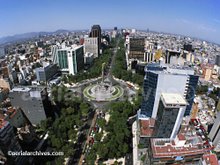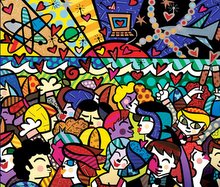Este es un ensayo de análisis que escribi al documental "La virgen y el toro" del escritor Mexicano Carlos Fuentes.
Siendo mexicana siempre he seguido la tendencia de la gran mayoría de mis compatriotas, a ver la llegada de los españoles a nuestra América como un evento sangriento y despiadado. Un evento que vino a destruir gran parte de nuestra original riqueza cultural pre-colombina, pero la verdad es que de no haber sido por esta conquista como tantas otras en el nuevo mundo, nuestra cultura Latinoamericana no seria lo que es el día de hoy.
Como la gran mayoría de la gente de América Latina, mi apellido paterno es de origen Vasco y mi apellido materno es de origen Español, pero esto no quita el hecho de que puedo ver en algunas de mis facciones rasgos indígenas, así como mulatos y españoles. Soy el reflejo de un “Capricho divino” y una rica mezcla de culturas.
Las comparaciones paralelas que hace Carlos Fuentes en el documental “La virgen y el Toro” son claras y honestas, aun un tanto atrevidas. A trabes de este análisis, Fuentes se atrevió a no horrorizar ni a escandalizar el tema de la conquista, haciendo por el contrario un análisis veraz y neutral sobre las razones y raíces de este hecho, haciendo como tema central el hecho de que los españoles experimentaron lo mismo que los indígenas de la después nombrada América.
En el tiempo cuando la cultura ibérica fue absorbida por los romanos, en España comenzó una mezcla de culturas que eventualmente y con las conquistas a seguir, la llevaría a convertirse en una de las civilizaciones más brillantes de la Europa medieval. Durante este periodo, se mezclo el sentido romano del derecho y el ibérico del individualismo y el honor. Mas adelante, la Invasión germánica acabaría con el poder de los romanos y culmino con el régimen de los visigodos, provocando la desaparición del núcleo romano y consecuente expansión del Islam.
En 711 un ejercito árabe zarpo de Marruecos y desembarco en Gibraltar. Los reinos godos ofrecieron escasa resistencia y los ejércitos islámicos dominaron el sur de España, siendo la batalla de Covadonga la que mantuviera fuerte el núcleo cristiano en la parte Norte. Por más de 700 anos, entre 711 y 1492 cristianos y musulmanes se observaban desde fronteras crepusculares combatiéndose pero también mezclándose. Entre sangre y sabiduría lograron enriquecer una sola cultura, permitiendo que una ¼ parte del castellano sea de origen árabe.
A diferencia del resto de Europa, la cual estaba siendo ensombrecida por la barbarie, los árabes trajeron a España música, ciencia, cultura, astronomía y textos perdidos de los griegos. Además de contribuciones culturales, religiosas o en las ciencias, Los Árabes hicieron grandes contribuciones arquitectónicas a la cultura Española tales como la mezquita de Córdoba y el Palacio de Alambra (La ciudadela roja) en Granada.
Viviendo su propia y constante lucha interna contra los moros, España fue el único país europeo que no fue a las cruzadas, la realidad es que viviendo esa lucha religiosa, política, y cultural dentro de sus propias fronteras, lo ultimo que necesitaban era salir a buscar otro conflicto.
A pesar de que las culturas dentro de España se mezclaban, tal y como pasaría mas adelante en América, el cristianismo medieval en la parte norte de España estaba empeñado en convertir al judío y al musulmán pero a la vez abrazando ambas culturas y mezclándolas para enriquecerlas. A pesar del gran dominio que los Moros ejercían sobre los españoles, los reinos cristianos poco a poco empezaron a fortalecerse, logrando un renacimiento y organización de comunidades medievales, creando las primeras cortes y ciudades fortaleza. Fue en estas cortes que nació la actual democracia de muchos países de América Latina. Cuando llego la época de la reconquista de España por parte de ejércitos y guerreros Cristianos, también creció la intolerancia y persecución contra los judíos de España con actos tales como el denunciarse a si mismos a través de insignias en sus ropajes por mandato del papa, así como actos de violencia irracional y su mas tarde expulsión de España bajo el mandato de los Reyes Fernando e Isabel en 1492.
Cuando Cristóbal Colon arribo a América junto con el resto de los conquistadores, los indígenas no sabían si estaban viendo hombres blancos o Dioses, y tampoco sabían “si serian tan compasivos como sus cruces o tan despiadados como sus espadas.” Como en toda conquista, la llegada de los Españoles conquistadores a América fue destructiva, sangrienta y conflictiva, pero así como los eventualmente los Moros enriquecieron a la cultura española, de la mezcla de españoles, indígenas y negros nació la América policultural que conocemos el día de hoy.
Cabe aclarar que a comparación de los españoles, los indígenas estaban en clara desventaja, ya que a pesar de ser civilizaciones bélicas, no tenían los avances en armas tales como espadas de acero y pólvora que tenían los españoles. Una gran similitud entre la invasión de España por parte de los moros y la conquista de América, fue que en ambas el sentido religioso estuvo claramente presente. El día de hoy se observa como la Virgen de España se asemeja a una emperatriz bizantina lo cual no es mas que una transformación de una antigua diosa oriental, de la misma forma en el nuevo mundo los antiguos dioses de los indígenas tuvieron que ser transformados a vírgenes, santos y deidades del catolicismo. Como Fuentes lo plantea esta fue una clara previsión del papel sincrético cultural que España jugaría en el nuevo mundo.
Es evidente que a pesar de que la invasión musulmana estuvo presente en España por 700 años, nunca llego a ser tan dominante como lo fue la cultura española en América, la cual erradico casi por completo religiones, monumentos y lenguas indígenas. A pesar del dominio ejercido por los españoles, la cultura indígena es aun presente en América Latina, en algunos países más que en otros tales como México, Bolivia, Perú etc… En el caso de México, hay varias palabras de raíz náhuatl o azteca que han sido “españolizadas”. Por ejemplo, la palabra Chocolate viene de la palabra náhuatl (dialecto que hablaban los aztecas) xocolatl que significa “agua amarga”, a un “straw” en México le decimos Popote, que viene de la palabra popotl en nahuatl y significa tallo de una especie de gramínea o paja. Como estas palabras hay miles tales como; Guacamole Ahuacamolli, Tomate tomatl, Coyote coyotl etc…
Desde un punto de vista personal, considero que algo que jugo un factor importante en diferenciar ambas conquistas, es que en el caso de los moros, a pesar de haber conquistado e invadido a España, dudo que jamás los hayan visto como unos salvajes, incivilizados los cuales probablemente carecían de alma. En el caso de los españoles, así es como veían a los indígenas, provocando que desde su punto de vista, no quedara más que destruir todo lo que ellos habían construido para convertirlos, educarlos y porque no “españolizarlos.” Como Fuentes claramente plantea, el español ya había experimentado el co-existir y en definitiva eran policulturales a diferencia de los indios. Por otro lado ya habían experimentado el ser oprimidos (por los Moros) y también el ser opresores (con los Judíos). Eran experimentados en la guerra y como importante factor, eran portadores de la energía de la reconquista después de 700 años de lucha contra el infiel y estaban motivados por una visión implacable de conquista y expansión.





